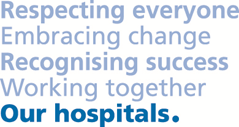






University Hospitals Bristol and Weston NHS Foundation Trust (UHBW) was formed on 1 April 2020 following the merger of University Hospitals Bristol NHS Foundation Trust and Weston Area Health NHS Trust.
This website provides information about our Bristol services.
© Copyright University Hospitals Bristol and Weston NHS Foundation Trust 2025



